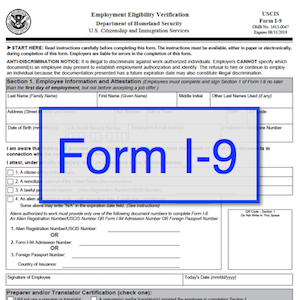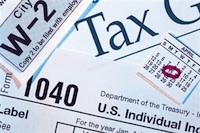 Tax time is probably not your favorite time of year, especially if you have to pay the government your hard-earned dollars. Here are five tips on how we can make it just a bit less painful.
Tax time is probably not your favorite time of year, especially if you have to pay the government your hard-earned dollars. Here are five tips on how we can make it just a bit less painful.
1. Have patience.
Practicing patience will go a long way when you’re dealing with taxes. Keep in mind that for tax professionals, the months of January through April are as crowded and hectic as a shopping mall in December. Parking is scarce, the sales clerks are doing the best they can, and customers are all trying to shop for presents, party items, and decorations in a very compressed time period.
Be patient with yourself as well. You have the skills to manage your business and do well at your career, but it may not be at organizing paperwork or dealing with numbers. That’s where we can help.
2. The tax stack.
Set aside a permanent place on your desk to be the tax stack. When you receive something in the mail that is tax-related, place it in the tax stack. You’ll save valuable time later not having to look for documents you need.
Similarly, create a folder on your computer for tax items. Under Documents, create a folder called Taxes. Within that folder, create a folder for the tax year, such as 2017 for the year just ended. Move all of your tax-related computer documents into that file.
At your leisure, scan in or take a cell phone picture of the paper documents in the tax stack and place the digital file in the Tax folder. Now you’ll have everything in one place and you’ll be so organized that your tax accountant will be surprised!
3. Catch up.
If your books or records are behind for 2017, get them caught up now to beat the rush. If you wait until the first week of April, you’ll probably need to file an extension. Keep in mind that an extension only grants a paperwork extension; it doesn’t delay any tax payments that are due. If you wait too late, you’ll have the stress of waiting until the last minute, the stress of paying estimated taxes, and the stress of waiting until your return is finally filed.
4. Early bird.
Connect with us or your tax professional early to agree on what services will be offered and to get your documents turned in as soon as you receive them. Getting your things in early will mean less waiting time for preparation and filing. Wouldn’t it be great to be able to say that you’re done with your taxes in February? Your stress will be less, and your energy can be redirected to new projects.
5. Avoid a large tax payment.
The worst thing about tax time might just be writing a big check, possibly with penalties, to the government in April. Instead, plan ahead and spread out your payments for next year by adjusting your payroll withholding or making quarterly estimated tax payments. Spreading your tax payment throughout the year will have you writing a smaller check, if any, in April.
Try these five tips for tax time, and you’ll have more energy for other, more important things in your business.
 It’s always a huge relief to many people who get their taxes done early. That gray cloud of stress that nags at you to get it over with can be gone in a matter of weeks instead of months. April is right around the corner, and here are a few tips to cross that task off your to-do list way before spring.
It’s always a huge relief to many people who get their taxes done early. That gray cloud of stress that nags at you to get it over with can be gone in a matter of weeks instead of months. April is right around the corner, and here are a few tips to cross that task off your to-do list way before spring. The I-9 form is used for employment eligibility when hiring new employees. It is one of many forms that need to be completed when you onboard a new employee.
The I-9 form is used for employment eligibility when hiring new employees. It is one of many forms that need to be completed when you onboard a new employee. Sales tax laws are constantly changing, and sales tax audits have increased since states and local agencies have become creative about finding new ways to generate revenues. If you haven’t made any changes in your sales tax procedures in a while, you are probably at risk.
Sales tax laws are constantly changing, and sales tax audits have increased since states and local agencies have become creative about finding new ways to generate revenues. If you haven’t made any changes in your sales tax procedures in a while, you are probably at risk. Cash flow improvement is a hot issue for small businesses; in many businesses, it seems like there is never enough cash when you need it. The last thing a business owner wants is to reduce their cash balance unnecessarily. To help you preserve or increase your cash, here are five cash management leaks to avoid.
Cash flow improvement is a hot issue for small businesses; in many businesses, it seems like there is never enough cash when you need it. The last thing a business owner wants is to reduce their cash balance unnecessarily. To help you preserve or increase your cash, here are five cash management leaks to avoid. When you think of an accountant’s duties, you might think about traditional tasks, such as tax preparation, bookkeeping, and financial statement preparation. Here are five additional tasks that accountants can help with that you might not think of.
When you think of an accountant’s duties, you might think about traditional tasks, such as tax preparation, bookkeeping, and financial statement preparation. Here are five additional tasks that accountants can help with that you might not think of. Year-end is coming up for many businesses, and it’d be nice to know what your final revenue and profit numbers will be for the year. Before we can calculate these key numbers, there are year-end adjustments that may need to be made to your books that will change the numbers. Here are seven common ones.
Year-end is coming up for many businesses, and it’d be nice to know what your final revenue and profit numbers will be for the year. Before we can calculate these key numbers, there are year-end adjustments that may need to be made to your books that will change the numbers. Here are seven common ones. We know we’ll never make tax season your favorite time of year, but perhaps we can make it easier. Here are five things you can do now to smooth out the time required to pull your records together for your tax preparer.
We know we’ll never make tax season your favorite time of year, but perhaps we can make it easier. Here are five things you can do now to smooth out the time required to pull your records together for your tax preparer.

.jpg)



